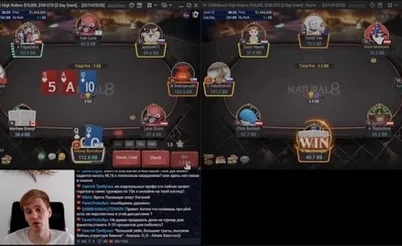Ilya Gorodetsky: Today we have a special edition of Big Pots Show. The reason for making this episode is unfortunately quite tragic. A Canadian regular Matthew Bergart was recently killed at the age of 30. We've been talking about him a lot and you Alexi said that he is one of the most talented players out there.
As far as I'm concerned, he was a record holder for the number of hands played for the last year among high stakes players.
Alexey "avr0ra" Borovkov: Matthew was not a very popular player. He kept a low profile. Nobody even knew how he looked. He never visited live events, but he played a lot online, in huge volumes, and people wrote a lot of touching posts about him on Two Plus Two.
It was interesting to read people's memories of playing against him. He started playing online from very low stakes like NL5, and NL10. So he climbed from the very bottom of online poker and even if not many people knew about him, he was the number one player in terms of playing volume for the last year on GGPoker.
It's a really big achievement actually, because playing on GG Poker is tough. You have to face really tough opposition, like here for example, we have a hand from his heads-up match against Viktor Kudinov.

Hand #3: Matthew Bergart vs Viktor Kudinov ($23,440)
Avr0ra: In some ways, this hand became the hallmark of this match and maybe the hallmark of Matthew's whole career. So I think it's reasonable to start with this hand. It's the beginning of the match, as far as I remember. So they just started playing.
Viktor opens, Matthew defends. It's a correct call. You have to play all the suited hands heads-up.
The Flop:
An action flop and Viktor starts with a continuation bet. No questions here. His hand is a perfect candidate for a continuation bet. I mean, he probably should bet this hand 100% of the time. I don't think we need in our checking range. I mean, we can check sometimes, but betting looks really good and it's very logical.

We can fold out some backdoor draws that are stronger hands, like I don't know, . These potential monster draws or open-ended straight draws and the backdoor flush draw right now are really good to play aggressively. We only want to check this if our opponent puts a lot of money into the pot on the future streets or if we never fold out draws that dominate us.
Here we have the opposite situation where we will fold out hands like of , although we didn't make him fold , but he raised. It's different and a very reasonable raise from Matthew.

Backdoor straight draw, backdoor flush draw, and this is a lot actually for a heads-up match. Oh, believe me, this hand is at least a mix between folding and raising, and I think Matthew chose between those two options and decided to raise.
The Turn:
on the turn actually helps both players and Matthew checks. He's definitely not going to check-fold. I mean, a flush draw in a heads-up game, well, it's tough to not realize your flush draw here.
It's a very strong draw in a heads-up match. So whatever Viktor does, Matthew is not going to fold his hand. I mean, if Viktor bombs like he bets a really big, like huge overbet, maybe, but it happens really rarely and we can decide on the spot. But besides that, I think he already had a plan to check-raise this one.

Well, maybe it's not the strongest hand for a check-raise and actually this hand is very technical. And I can go on and on about why this hand is not a very good check-raise, but I assume he thought that he doesn't want to bet this hand all the time because he has to give up on blank river cards. He doesn't really want to bluff with a busted flush draw on the other hand.
So yeah, I think he thought he doesn't want to bet all the time and this time he decided to check-raise. I'm not sure if it's justified theoretically. I never checked this out, but I'm sure it's fine in the real game. I can tell it openly to everyone, in heads-up you can do whatever you want. It won't be a big mistake. It's really hard to make a big mistake playing a strong draw in a heads-up game. We will most likely generate at least some fold equity in any node.
Viktor bets. He has a monster draw now and basically his hand plays itself.

When we have a monster draw, yes, our opponent did check-raise and now checked, but still, he has a pretty wide range.
We can definitely fold out some hands and we have the nuts. All the cards are in our hands, both literally and figuratively speaking. Or maybe we can find some arguments for a passive play, but those have to be some really good notes or maybe something really tricky or sneaky from Viktor.

This hand plays itself, although we can discuss sizing choices. But again, if we use a solver, we can try a lot of different sizings and the program will find a way for each and every one of them. So here, if you build your range well, you have enough value hands, enough bluffs, and everything is balanced, I don't think the choice of sizing matters at all.
Well, maybe Viktor wants to build his range here around some medium-strength hands, like weak combos, maybe even some combos. Is with a backdoor, he can call on the flop, maybe even without a backdoor draw.
The River:
On the river , I think Matthew just checked to give up because he wants to have some blockers to bluff here.
The pot is very big already. So to bluff, we want to block sets, we want to block two pairs.
We need a decent blocker here to be able to bluff. I think he tried to fold out pocket pairs from Sevens to Tens, plus maybe some bluffs that Victor called the check-raise with, and then decided to bet once. And when he failed to do that, he decided to give up.

And Victor, of course, has to bluff here every time. A very profitable bluff. You need some really strong arguments to refuse bluffing here. And maybe Victor had those. They've played a lot against each other and, of course, Victor studied Matthew's game. And maybe he just felt that this double check-raise is very strong. And maybe Matthew has some combos. This check is very often a trap.
So yeah, for some reason, Victor decided not to bluff. Well, he min-bets here, but basically, it's a check. It's the same as him giving up. Or maybe it's just a misclick. It could, very well be a mouse slip.

Hand #2: Matthew Bergart and Wiktor Malinowski ($36,588)
This hand is very interesting. A lot of exploitation going on here. Both were playing far from theory, using their gut, and using their mental abilities.
This is a very standard squeeze for Matthew with . It's enough dead money in the middle for us to stack off against Magic, almost 3,000 of dead money. And it's fine for us to stack off against the pocket pair. We can fold out offsuit.

So yeah, we are okay squeezing and stacking off with this hand against a recreational player because of the extra 600 from Wictor.
A very happy squeeze for Matthew here.
Wictor decided to call and we are already in uncharted territory. I mean, it's really tough to put Wictor on a range here. Ask different professional players and everyone will give his own vision, his own version of his range for this spot. For example, does he have suited connectors here? Does he have a hand like suited? I personally think not, but I wouldn't be really surprised if I'm wrong.
I already can't estimate Wictor's range here, so I have to make some assumptions. It all comes down to how he estimates the pot, all those antes and stuff, and how he constructs his ranges in the first place.
Yeah, probably only Wictor knows what he plays here. And Matthew, I think, also had no idea.
The Flop:
A very unconventional start to a hand. A three big blind raise, a call from Wictor, and then another call against a squeeze. So yeah, well, he definitely has some pocket pairs like Fives, Sixes, Sevens. So he should feel really good on this board. We don't know about suited connectors. We don't know about Broadway suited hands, like suited, for example. But we definitely know he has those pocket pairs, Fives to Eights.

We have two options; bet big or check. And both look fine with . By checking, we don't fold out hands like or suited, which we dominate. And maybe we can check-raise if he decides to bluff those. So, checking looks totally fine.
Where we have a pot of 5,000, around 13,000 behind, and for an SPR of two, we have the stone-cold nuts. So our goal is to shove all of our money into the pot quickly.
Oh, he has 16,000 in his stack. Well, the SPR is three, not two, but everything I said is still relevant here.
Wictor's hand here is also pretty much nutted for him. I mean, Sixes would be better because of the open-ended straight draw, but Sevens are still good enough here to put a bet and play for stacks. But he decided not to bet. Probably he realizes that he will not often see a call here. His opponent will mostly check-fold or check-raise, and it's not the best option for pocket Sevens.
So he decided to pot control in some ways and to see the turn card.
The Turn:
Matthew checks again.
Here, I think Matthew would prefer check-calling, and that's exactly what he did.

The River:
Everything goes according to Wictor's plan until the river, where comes and Matthew decides to block bet.
This card improves Matthew's range a lot overall, and he also has some bluffs, hands like . He can sometimes bet like this as a bluff to maybe fold out pocket Sevens. He can fold sometimes with a hand like this with a 10% bet.
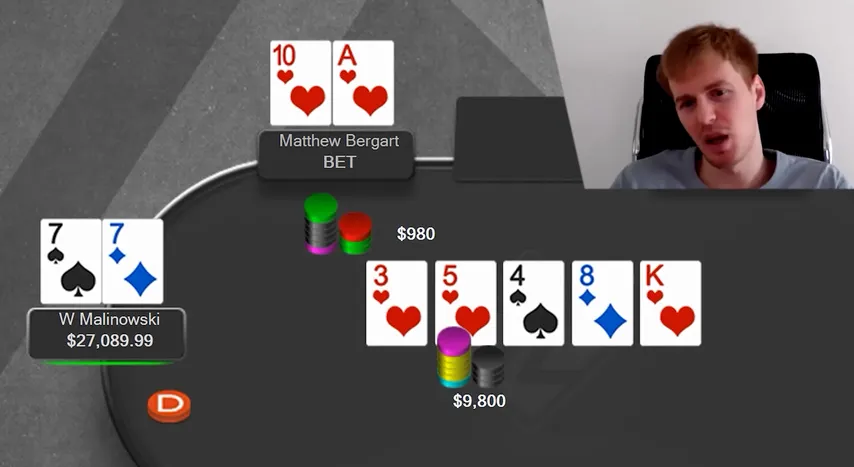
It's really awkward for Wictor to call his hand, because in terms of possible bluffs for Matthew, we only have some random that decided not to bet flop, not to bet turn, and not to check-raise turn. Well, not a lot of combos at the end of the day. I still don't think he will fold this hand. Well, maybe he can fold combos, but not Sevens, I think. And in the end, he decided to go all-in.
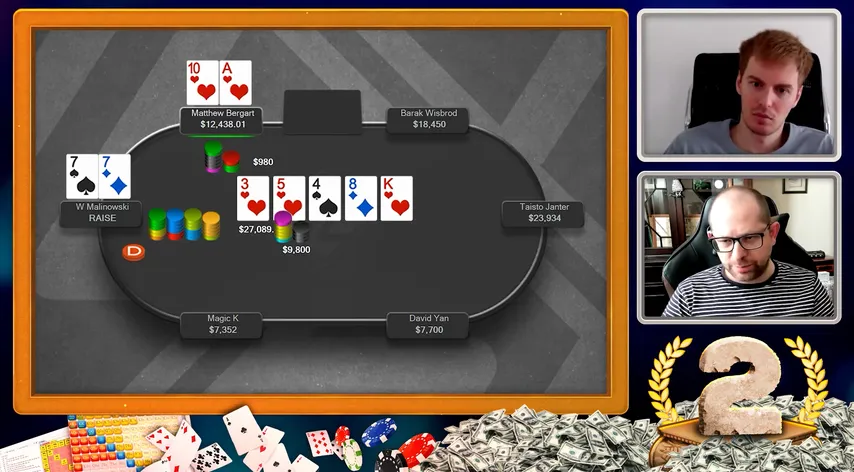
So he thinks there are no flushes in Matthew's range, right? Because he will never fold out any flush, even when he goes all-in.
So Matthew has to guess whether Wictor is value-betting here or bluffing. Well, most likely he's value betting, right? So Stefan really likes to put opponents in a spot where they either over-fold, so fold more than they should in theory, or they have to think a lot about the spot.
So he has a very tough decision, he has to think about it a lot, and he will never over-call. He may over-fold easily, or he has to work really hard, think a lot to try to call optimally. So the chances of him over-calling are slim to none, and it makes it a great opportunity to bluff.
So yeah, for advanced players, it's an obvious spot that they both work around combos. And yeah, technically this hand is really hard.
Eventually, Wictor went for a really expensive bluff on the river, and the whole thing looks pretty reasonable and logical for Wictor.
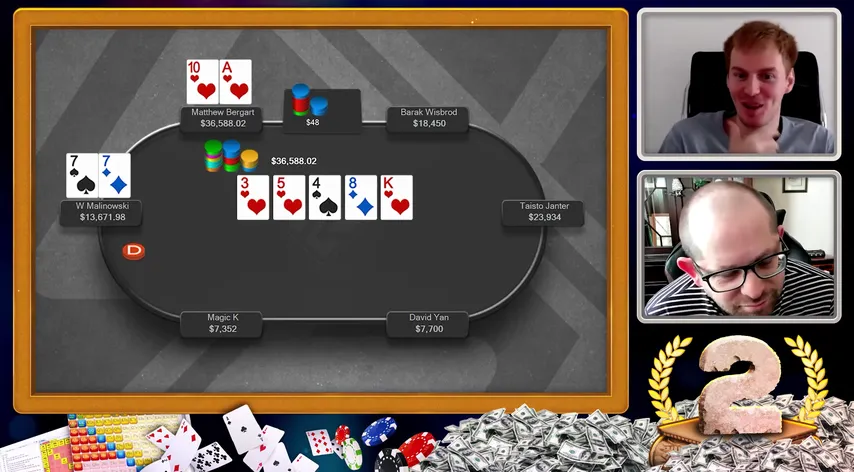
He went for a tough line on the flop, and even pre-flop he could have folded this hand pre-flop. It's not mandatory to defend it with a weak range after just calling Magic's open raise. So he chose a tough line preflop, a tough line on the flop, and he used his last opportunity to win this hand on the river by bluffing his Sevens.
But here we can say that Matthew actually outplayed Wiktor, because he ended up with a hand that's not . And of course, he happily calls. One of the best situations in high stakes poker actually; when your opponent tries to represent a hand that you actually have.
Hand #1: Matthew Bergart vs Misha Inner and Taisto Janter ($56,133)
Okay, next hand against Taisto Janter from Estonia and Misha Inner is here as well.
The Flop:
Everyone hits something on the flop. Misha of course always checks here after calling the big blind. And Taisto has two options basically – those are betting small and check-raising. Both options are fine, none of them is better than the other. And ideally, he wants to have Sevens in both check-raising and betting ranges.
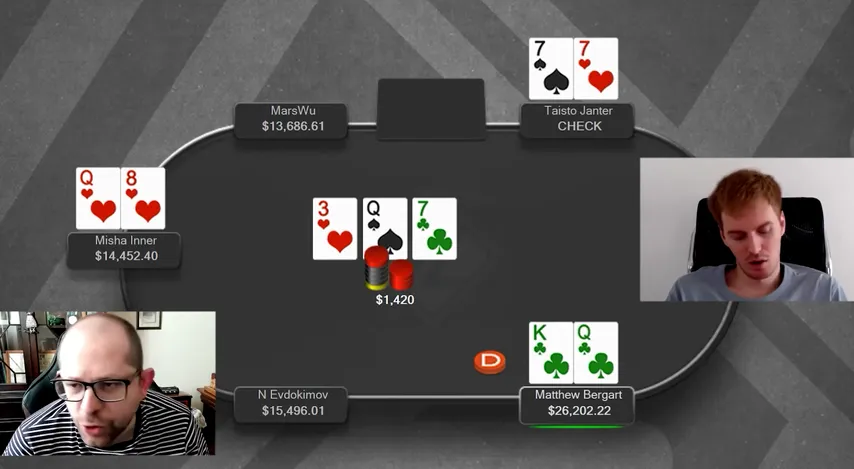
So, a high-level player should either randomize or choose the option that he thinks would be best against a certain opponent. He checks.
Spoiler alert, we will get here to the river with a very small pot, but they will find a way to play for stack anyway.
There's an old poker rule, I believe Beluga Whale was the one to come up with it, maybe some old-school guys remember him. And it goes like this – if you lost a small pot with a set, you've played this hand wrong.
So with the set, or with any other hand from the very top of your range, you have to play for a big pot. You have to find a way to play for a big pot. And it's up to you how to do that. And in this hand, you will see the pot will very quickly grow from 7 big blinds to 100, quicker than you can imagine.
The Turn:
Not a very pleasant turn card for Misha. And we should also highlight Matthew's check on the flop. Not a standard play, this hand should bet a lot. But multiway, again, yes, is a very nice-looking hand on this board. But do we have three streets of value against Taisto, let's say? Probably not, maybe only if we hit a King or a flush.
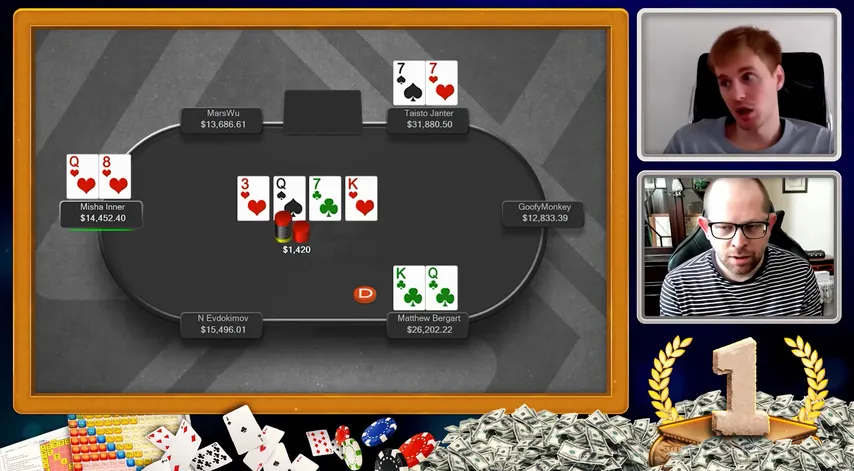
So yeah, this hand is worth like two, maybe two and a half streets of value. So we can easily delay betting to the turn, pretty much the same logic as for Taisto's Sevens. So yeah, for some reason Matthew decided to check, even though it's a very high-frequency bet. But it's okay theoretically I think, because again, we don't have three streets of value here. So we can as well start with the check.
on the turn is a great card, because opponents have hands like , , , and they will put a bet with those hands. And they basically have zero equity against our hand. It's a great turn for Matthew, his pot share goes up significantly. Both opponents have , in their ranges and they will put at least one bet into the pot with those.
Yeah, this hand is remarkable because we have a great flop for everyone. And then we have a really nice turn for everyone, almost everyone.
Yeah, that's true. And Taisto starts betting. Well, no questions about it, it's a great bet with a set.
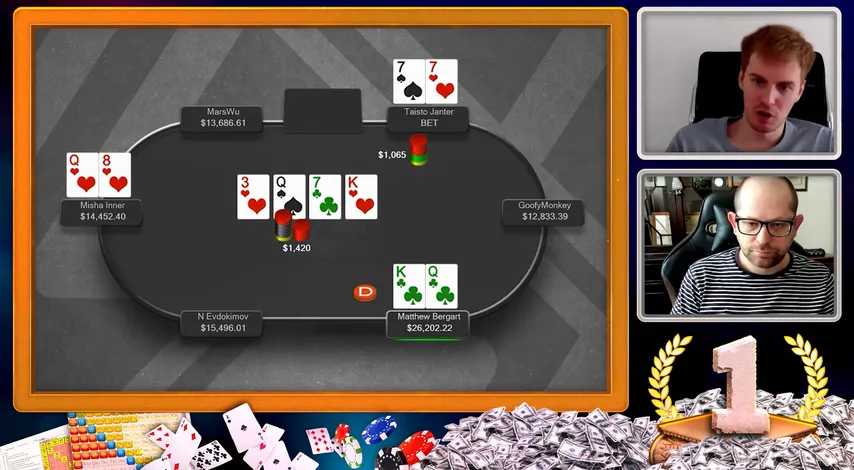
He wants to get value from some combos, from some combos that checked on the flop. He's also fine with folding out hands like Eights and Nines, because those hands will never put any money without hitting a set. And even though the chances are very low, he will lose a huge pot if it happens. So yeah, logically we really want to bet our sets on the turn.
And Misha could have considered check-raising here. But all in all, his hand plays itself. We have some sort of a bluff catcher with a flush draw as backup. So it's a very comfortable check-call.
The River:
And a lethal river card for Taisto. Oh, and then a non-conventional check on the river from Taisto. Maybe he thought there are a lot of combos in opponents' ranges.
Not an easy spot actually. I don't know why he went for a check-raise instead of betting. He's not blocking a . And is not betting here.
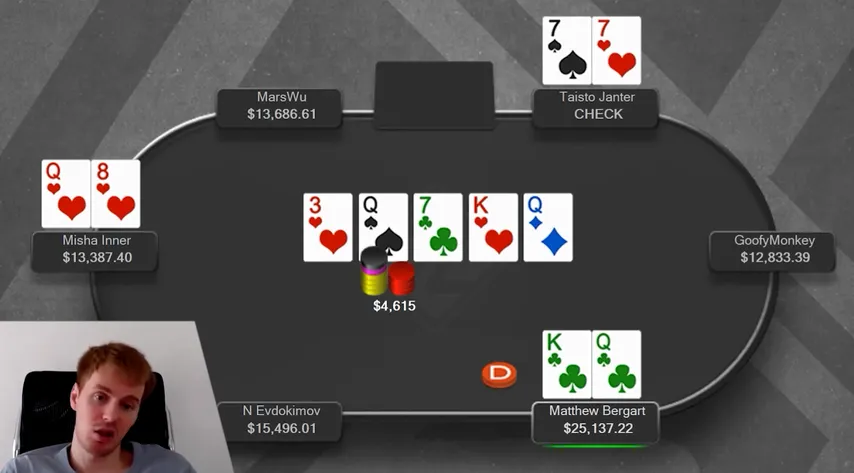
Yeah, very unconventional line. He is specifically targeting combos with this check. Maybe he didn't care about the King, thinking that we will not make a lot of money against the anyway if he block bets, for example. And combos may not raise against the block bet. So he decided to check-raise to specifically try to cooler combos. There are not a lot of them, but there are some. Maybe that's what he thought. But I didn't expect him to check.
Ilya: Well, maybe he did that because of his reads on Bergart. Maybe he thought that Bergart will often bluff here and will never go to showdown with a hand with zero equity. He has all of those and flush draws in his range. And maybe Taisto thought that he will always bluff those hands, even against two opponents. And Taisto won't get any value from those hands otherwise.
Avr0ra: Yeah, maybe he's trying to get some value from bluffs. That's a good point. A lot of combos here, flush draws.
Yeah, he also gets some value from bluffs this way. But I think that he first of all targeted combos. We want to play for stacks and we think hands would pay us off.
A very tricky play from Matthew, he bets really small, trying to represent a combo. Or maybe some weak combo. And yeah, the guys are again deviating from the theory.
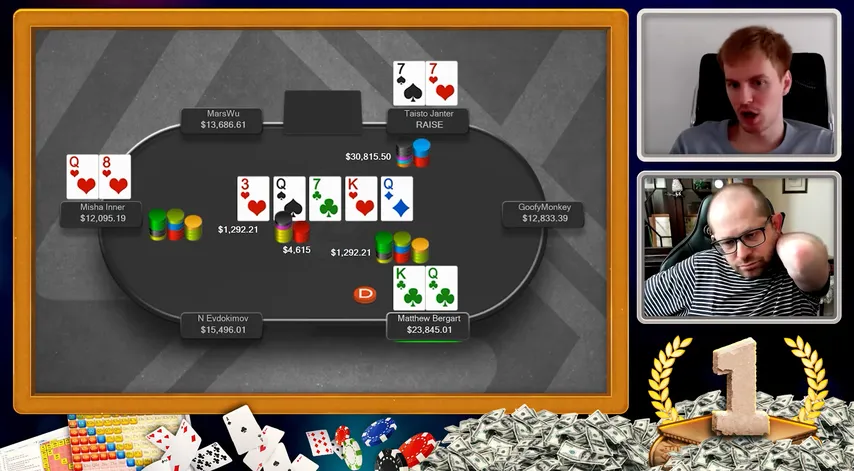
Ilya: Considering Misha's play, after Avr0ra, the preflop raiser, checks, and Matthew bets small, isn't it tempting to raise his Queen-Eight combo?
Avr0ra: Oh, no, no, no. We have three players on the river. And we have a weak . And our opponent Matthew, by betting small, represents a strong or a weak . So he represents a hand like or e. And we lose to both. So yeah, is nothing but a bluff catcher. He may even consider folding, although no one will actually consider folding in the real game, because Matthew can easily bet worse. He can bet combo, he can have a bluff, as you pointed out.
Well, we don't really beat value hands. But it's a nice bluff catcher. It is a hand that our opponent is trying to represent. So it's a nice call.
And now when we face two shoves, it's a very nice fold from Misha.
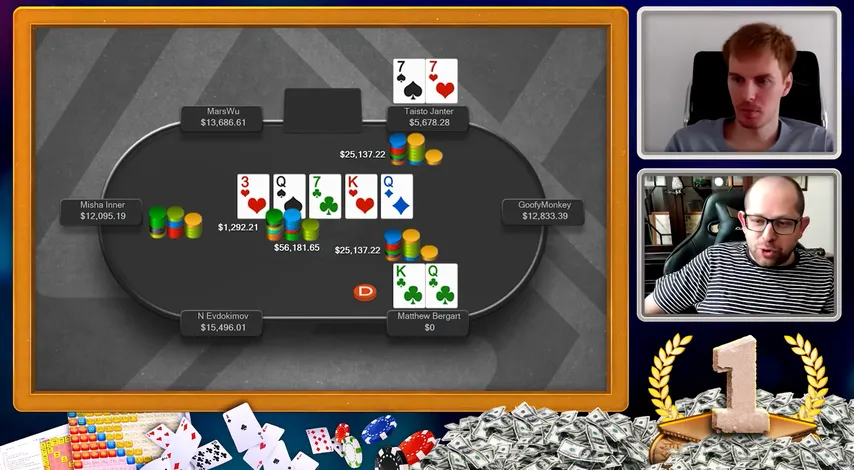
Yeah, Taisto's setup has worked. But it turned out that the hunter was the prey in this case.
Ilya: Yeah, exactly. Well, probably not a very great joke considering the reason that we are reviewing Matthew's hands today. So yeah, probably not a great idea.
Avr0ra: Well, black humor, right?
Ilya: From what I know and from what I read about Matthew, he was a guy who would not get offended by things like that.
Avr0ra: Yeah, he trapped his opponent here really well. And again, a very tough hand technically. And a happy fold from Misha. And it looks like he showed his hand to everyone else, because we see the hand.
Ilya: Okay, thank you very much Avr0ra for joining us. We wish you best of luck in your poker and streaming career.
Thank you for helping us to honor the memory of Matthew Bergart. Again, I want to say that high stakes poker has lost a very bright character and a very good, very talented player.












